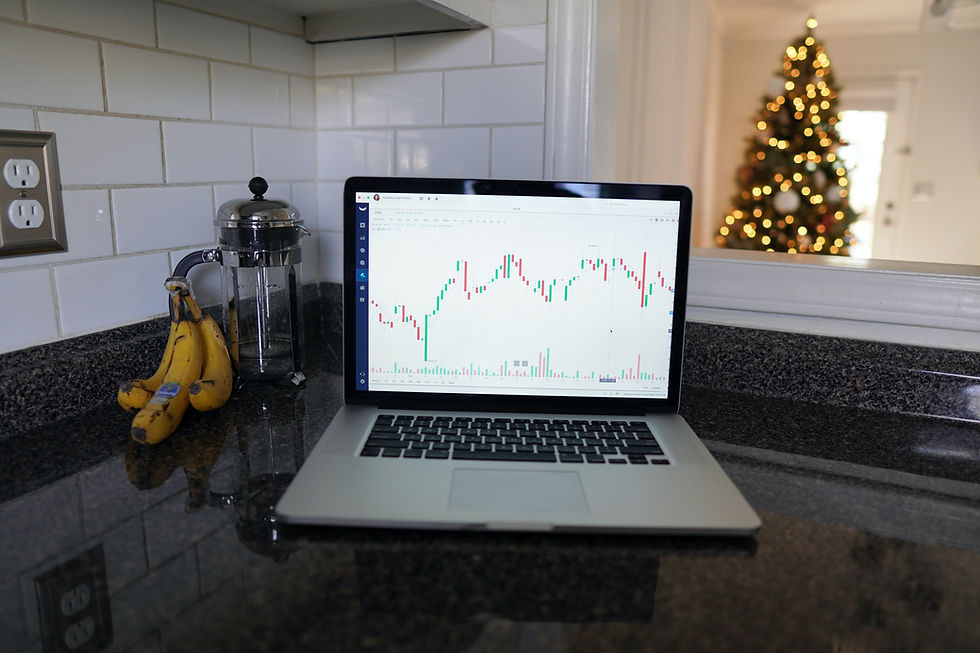Navigating Crypto Volatility: Advanced Techniques for Strategic Investing
- Money Dox

- Jul 21, 2025
- 4 min read
Master the ups and downs of the crypto market with advanced techniques for strategic investing. Learn risk management, on-chain analysis, AI tools, and more.
The rise of cryptocurrency is as rapid as its demise: it's a rollercoaster ride, and for serious investors, volatility is not a flaw but an opportunity. In this guide, we cover advanced strategies to leverage market mayhem for building a strong crypto portfolio.

1. Introduction
Cryptocurrency exchanges experience wild volatility, and prices can shift 5-10% in less than a day. All kinds of headlines draw a lot of FOMO, but it is those to strategize who think of volatility as a lever to multiply returns. In short, here is what will be covered in this article:
The causes of crypto volatility
Risk assessment mechanisms for capital protection
Advanced analytical tools
Trading and hedging techniques
Building psychological fortitude
2. The Gravy Train of Crypto Volatility: Crypto Driving Wild Price Swings?
Market Size & Liquidity
On one hand, there is the total crypto market cap of approximately $2 trillion. More gigantic by comparison, traditional finance sends minimal price action on these dumping and pumping.
Regulatory News Dropping announcements—like banning exchanges in their country—result in immediate +15% drops within hours.
Whale Maneuvers Large holders (usually called "whales") who move coins on-chain often anticipate an imminent price change.
Social Media Hype A tweet, or a thread on Reddit, has the potential to make a currency fluctuate by 20% in a matter of minutes.
Traditional Markets vs. Crypto
Feature | Traditional (Stocks/Forex) | Crypto |
Typical Daily Volatility | 1–2% | 5–10% or more |
Trading Hours | Limited | 24-Jul |
Market Maturity | Centuries | Just over a decade |
3. Risk Assessment and Management
Define Your Risk Tolerance
Capital Allocation: You should never risk more than 1-2% of your portfolio on one trade.
Time Frame: Align your strategies to work in days to weeks for short-term swings or months to years for long-term holds.
Diversification Outside Crypto
In the crypto world, spread among large caps (BTC, ETH), mid caps (ADA, SOL), and selective altcoins.
Outside crypto: extend to equities or commodities for cushioning functions during extreme crypto drawdowns.
Smart Order Placement
Stop-Loss Orders: Exit automatically when losses hit the set limit.
Take-Profit Orders: Secure profits based on a target price level so that they do not give back profits.
4. Advanced Technical Analysis Tools
Candlestick Patterns & Chart Formations
Engulfing patterns warn of reversals.
Triangles and flags indicate continuation after some consolidation.
Fibonacci Retracement & Elliott Waves
Use retracement levels (38.2, 50.0, 61.8) to find potential support/resistance.
Elliott Wave theory gives an outlook for multi-wave price structures.
Momentum Indicators
Moving Averages (MA): The "golden cross" of the 50-day vs. 200-day can signal big bull runs.
Relative Strength Index (RSI): above 70-overbought, below 30-oversold.
MACD: Shows how MACD diverges between the short-term and long-term moving averages, giving signals for changes in trends.
Volume Analysis
Higher volume on price movements will confirm breakouts.
Learn more: Proceed with our Technical Analysis Deep Dive.
5. On‑Chain and Sentiment Analysis
On‑Chain Metrics
Volume of Transactions: Spike precedes big move.
Active Addresses: Higher addresses mostly predict usage of the network.
Whale Watching
Track big transfers from the exchanges using tools like Whale Alert.
Social sentiment tools
LunarCrush & Santiment: Integrate sentiments across social platforms.
Google Trends: Sudden bumps in search often predict surges in price.
6. Strategic Investment Approaches
Dollar‑Cost Averaging (DCA) vs. Lump Sum
Approach | Pros | Cons |
DCA (regular buys) | Smooths out volatility | May miss big entry points |
Lump Sum (one‑time) | Captures immediate gains | Risky if the timing is poor |
Active Trading Styles
Swing Trade: Holding for Days to Weeks to Capture Medium-term Trend in Capture.
Position Trading: Kept Open for Months based on Theme Macro
Arbitrage Opportunities
Exploit price discrepancies between exchanges through bots, but consider slippage and fees.
Hedging Derivatives
Futures and Perpetuals: Future prices are locked to protect the spot holding.
Options: Put down the cap status, downside, and upside potential are retained.
7. Automatic and AI Use
Crypto Trading Bots
3Commas-based DCA, grid, or momentum strategy automation.
AI-based Signals
A machine-learning model investigates thousands of known variables-one being news sentiment-and on-chain data for short-term forecasts.
Warning: Any over-automation effort would backfire in a black-swan event. Always check for changes and readjust.
8. Staying Well-informed and Flexible
Market News: Mainstream sources would include, among others, CoinDesk and The Block.
Regulatory Updates: The forecasting of policy changes can be done through subscribing to on-chain legal newsletters.
Community Engagement: Access vetted groups on Telegram or Discord for immediate insights.
Internal Resource: Visit our Crypto Insights Newsletter weekly for analyses.
9. Psychological Resilience in Volatile Markets
Manage FOMO/FUD: Create a checklist before entering trades, so as not to impulse trade.
Discipline & Control: Follow your trading plan, even as prices move rapidly.
Journaling: Describe the entry and exit rationale, the outcome, and things learned to improve the overall strategies.
10. Conclusion
Volatility can be perceived as an opportunity in a more strategic sense. Armed with proper risk management, the latest analysis tools, automated systems, and psychological discipline, you would proceed with confidence through the choppy waters of the crypto markets. Always remember—"Volatility means opportunity" in crypto investing; hence, one must equip oneself with the right knowledge and strive to seize such moments.



Comments